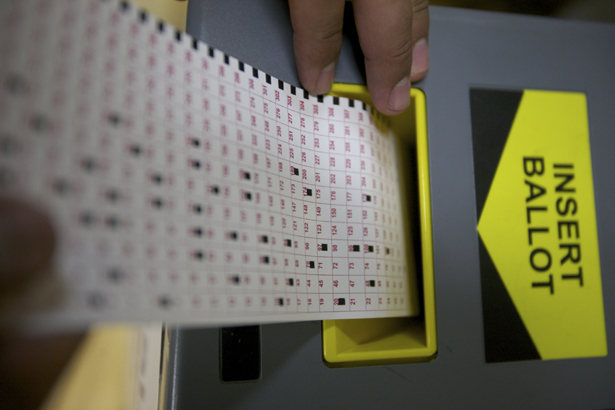
(AP Photo/Damian Dovarganes)
Democracy has taken quite a beating over the past several years, with the blows raining down from an increasingly activist and obsessively pro-corporate Supreme Court, voter-ID promoting Republican governors and legislatures, and Karl Rove’s empire of influence. It was easy to imagine, going into the November 6 election, that the fix was in. But the people pushed back, giving President Obama a 3.4 million popular vote victory, a 332–206 Electoral College landslide, a Senate that is more Democratic and more progressive, and a House with considerably fewer Tea Party extremists. Reversing the pattern of the 2010 Republican wave, voters chose labor-backed Democrats in seven of eleven gubernatorial races and handed key legislative chambers in New York, Maine, New Hampshire and other states to Democrats.
This has led some commentators to imagine that a template has been developed for defending the will of the people in the face of unprecedented financial and structural assaults on the democratic process. But that’s a naïve assumption. It obscures the fact that a combination of gerrymandering and right-wing Super PAC money prevented Nancy Pelosi and the Democrats from regaining control of the House, and that many state capitols are still dominated by anti-union die-hards like Wisconsin Governor Scott Walker, Ohio Governor John Kasich and their allies. And just because an incumbent president, reasonably well-funded Democrats, and fully mobilized labor, reproductive rights and civil rights activists were able in 2012 to push back against an unprecedented onslaught of right-wing Super PAC money does not mean they will be able to do so when more sophisticated and ever more abundantly financed conservatives return in 2014 or 2016—as they surely will.
The better lesson to take from 2012 is that voters really do want a fair and functional democracy, and that Democrats and their allies should use the authority they have been handed to fight for it. Americans do not want to cede control of their communities to austerity appointees, as evidenced by Michigan’s rejection of the emergency manager law that Republican Governor Rick Snyder deployed to overrule local elected officials. Americans recognize the danger of GOP-backed barriers to their right to vote, as Minnesotans showed by rejecting a constitutional amendment mandating photo voter IDs. And they do not want corporate money to dominate our politics any more than they want corporations to dominate our lives.
In Montana and Colorado, voters overwhelmingly supported calls for a constitutional amendment to overturn the Supreme Court’s Citizens United ruling—and with it, the fantasy of “corporate personhood.” That ruling, decried even by Senator John McCain as the “worst decision ever” from the High Court, ended a century of controls over the corporate dominance of politics. The Montana and Colorado votes align those states with California, Hawaii, Massachusetts, New Jersey, New Mexico, Rhode Island and Vermont—all of which have passed resolutions calling for a constitutional amendment to overturn Citizens United. And dozens of communities across the United States—including Chicago, San Francisco and conservative Pueblo, Colorado—have backed local resolutions promoted by groups like Common Cause, Public Citizen, Free Speech for People, and Move to Amend. Most did so by margins as wide as the 3–1 statewide votes in Colorado and Montana.
Popular
"swipe left below to view more authors"Swipe →
Montana went a big step further, electing as its governor Steve Bullock, the crusading attorney general who waged the boldest battle against the use of Citizens United to wipe away state laws that bar corporations from buying elections. Bullock lost that fight before the same Supreme Court that handed down the initial ruling, but his gubernatorial victory—after a campaign that declared, “If you believe elections should be decided by Montanans, not out-of-state corporations, stand with Steve Bullock”—offers a reminder that advocacy for real reform is smart politics.
That was especially evident in Senate elections, where some of the biggest winners were outspoken backers of a constitutional amendment to overturn Citizens United. Independent Vermont Senator Bernie Sanders made his stance a central theme of a re-election that secured 71 percent of the vote; he’s proposing a Saving American Democracy Amendment that says: “Corporations are not persons with constitutional rights equal to real people. Corporations are subject to regulation by the people. Corporations may not make campaign contributions or any election expenditures. Congress and states have the power to regulate campaign finances.” Ohio Senator Sherrod Brown, who beat back an unprecedented Super PAC assault, led his campaign website with a petition to “Overturn Citizens United.” Newly elected Wisconsin Senator Tammy Baldwin supports an amendment, as does Maine Senator-elect Angus King, an independent who is likely to caucus with the Democrats.
They’re not alone. President Obama argued in an online conversation shortly before the Democratic National Convention that “we need to seriously consider mobilizing a constitutional amendment process to overturn Citizens United,” and the Democratic platform declared: “We support campaign finance reform, by constitutional amendment if necessary.” The president may have an opportunity to appoint several Supreme Court justices who will recognize the need to reverse not only the Citizens United ruling but a series of decisions that handed overwhelming power to those with overwhelming amounts of money.
But presuming that the courts can quickly or certainly be repurposed as defenders of democracy is another naïve assumption. The president is right to argue that the movement to amend “can shine a spotlight on the Super PAC phenomenon and help apply pressure for change.” And the voters are right to say, as they have with their ballots in states and communities nationwide, that corporations are not people. Democracy is popular, so popular that it beat back plutocracy in 2012. Those who won have a democracy mandate; they should use it to repair the damage done and usher in a new era where money is controlled and the popular will is unleashed.
Do the math! John Nichols writes that it turned out Mitt Romney was the 47 percent candidate.


